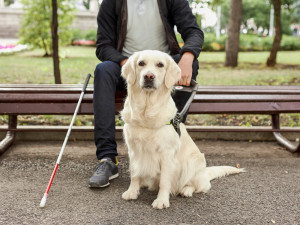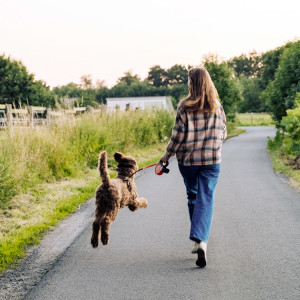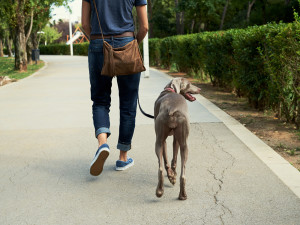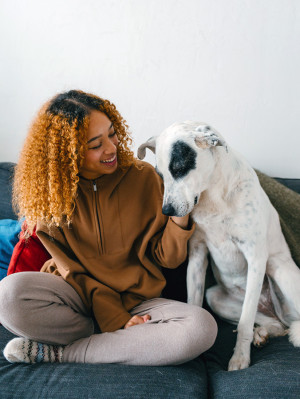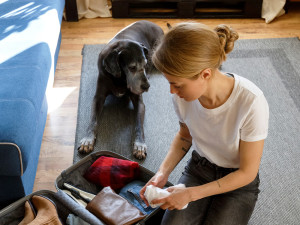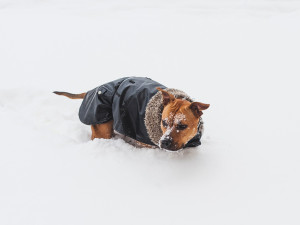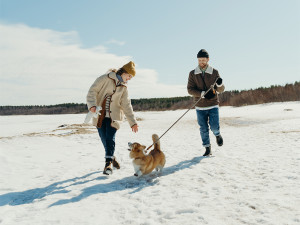Can I Register My Dog As a Service Dog?
If you’re considering applying for an assistance dog, or you have a dog that assists you in your daily life, here’s everything you need to know
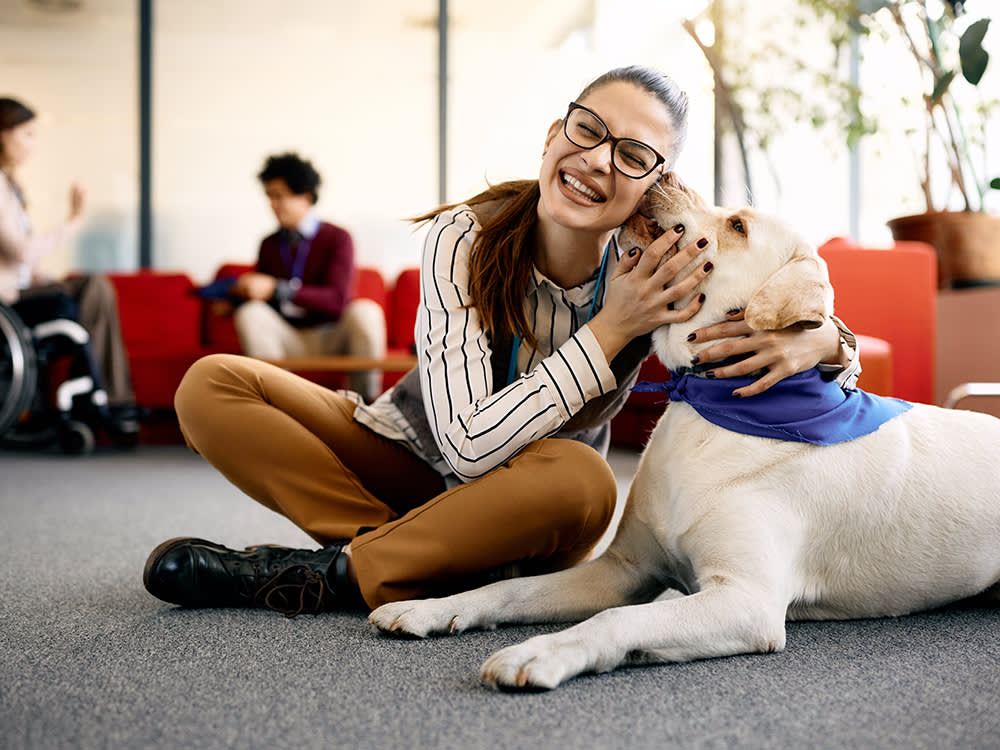
Share Article
Service dogs, or assistance dogsopens in a new tab as they’re better known in the UK, are a hugely important medical aid for thousands of people across the country. The organisation Assistance Dogs UKopens in a new tab has over 7,000 registered assistance dogs under its charity coalition, but there are thousands more service dogs without registration in the UK helping both adults and children with a range of issues, from mental health conditions to seizure alerts and physical mobility.
If you’re considering applying for an assistance dog, or you have a dog that assists you in your daily life, here’s everything you need to know about getting one, registering your own dog and what the rules are for assistance or service dogs in the UK.

Get (totally free) deals for food, treats, accessories, tech and way more pet parenting must-haves.
What is a service dog or assistance dog?
A service dog or assistance dog is a working animal that provides support to a person on a daily basis in order to help them live an independent life. They are often trainedopens in a new tab to carry out specific tasks, from practical things like opening doors or guiding their owner across a road safely, to notifying their owner when a seizure might occur or when their meal contains a dangerous allergen.
Assistance dogs in the UK can often be recognised by their jacket, which may state what type of assistance dog they are and show their ID. White and yellow jackets are most common for seeing dogs; hearing dogs might wear a burgundy jacket; while medical alert dogs might wear a red jacket. Not all assistance dogs carry ID or wear a jacket, though, and there is no legal requirement for them to do so unless transiting through international transport hubs such as airports or ferry ports.
The Equality Act 2010opens in a new tab explains in more specific terms what an assistance dog is considered to be within UK law.
What do people use service or assistance dogs for?
The best-known kinds of assistance dogs are seeing and hearing dogs, which help those with sight or aural impairment live an independent life by safely guiding them through public places. Assistance dogs are used for myriad conditions, though, from medical conditions to physical disabilities, which require the dog to be trained to open doors or assist with tasks around the house such as tidying or putting washing inside the machine.
Medical detection assistance dogs are usually used by people with complex health conditions, such as type one diabetes, Addison’s disease or epilepsy, as well as those with severe allergies to particular foods like peanuts or gluten. There are also assistance dogs for those with mental health conditions and neurological disabilities, such as people with autism or those living with post-traumatic stress disorder (PTSD).
While many assistance dogs no doubt provide emotional support to their owners, dogs used solely as emotional support animals are not considered assistance dogs in the UK as they are not referenced in the law.
Can I register my dog as a service or assistance dog?
There is no catch-all register for assistance dogs in the UK, however, many individual charities offer programmes that help disabled people and those living with medical or mental health conditions to train their own pets as assistance dogs. For example, the charity Darwin Dogsopens in a new tab works with those living with a diagnosed mental health condition to train their own pets as assistance dogs, while Dog A.I.D.opens in a new tab does the same for people with physical disabilities who might need help with day-to-day tasks.
Assistance Dogs UKopens in a new tab is a coalition of 12 member charities, many of which offer similar services for various conditions and types of assistance dogs. While there is no official qualification for an assistance dog, Assistance Dogs UK ensures all its members train dogs to a high enough standard to be reliable service dogs, so choosing one of their members will ensure you and your dog are given the best tools to thrive.
How do I qualify for and get an assistance dog?
Getting an assistance dog can be a long process, as organisations that provide working dogs are often overwhelmed with applications. Applying directly to individual charities is the only way to get an assistance dog if you don’t already have your own dog that could be trained up to a high enough standard to be your service animal. You do not need a prescription or letter from your doctor, but it may help if they can advocate for you in your application.
Usually, the basic requirements for getting an assistance dog are that you have a diagnosed disability or medical condition; you live in a property with suitable outside space for the dog to go to the toilet; and you (or a carer or family member) must be able to feed, groom and administer any medical care (such as giving flea/worming treatment) for your dog when necessary. However, each charity that supplies assistance dogs will have its own set of criteria a person must meet before they can be paired with a dog, and you’ll likely have to have an in-person assessment.
For example, Guide Dogsopens in a new tab, the charity that provides assistance dogs to the visually impaired, has a two-step assessment: the first involving a mobility screening in which they will look at your current vision and any mobility issues, as well as your knowledge of your local area, and the second involving an assessment of how much a guide dog might be able to help you in day-to-day life and whether you can keep the dog happy and healthy, too.
Where can assistance dogs go in the UK?
In the UK, assistance dogs or service dogs are protected under the Equality Act 2010, which states they should be permitted into all and any public places with very few exceptions. This means assistance dogs can stay in hotels without any extra room charge, they can visit all cafes, restaurants and pubs, and are allowed on all public transport in the UK. The only public places where they may not be allowed are sterile environments, such as operating theatres in a medical setting, or sometimes in places like zoos where they may cause distress to, or become distressed by the presence of, other animals.
Generally, travelling within the UK with an assistance dog is a relatively smooth process, as no identification is required unless you’re travelling abroad. When travelling internationally, as long as you book with a registered airlineopens in a new tab, you can fly with assistance dogs for no extra charge, and they can usually sit in front of you where there is space. If there is not enough room for your assistance dog to lie down in front of you, the airline may charge for an extra seat in order to create space. Note that you may need to register your pet’s arrival into the specific airport before you travel.
When travelling internationally, your assistance dog will also need to comply with all the usual rules around travelling abroad with an animal, which may involve an animal health certificate, EU Pet Passport, or specific medical treatment (such as worming) before your arrival or return, depending on your destination – your vet will be able to advise on what is needed.
If you’re planning to take the Eurostar with your assistance dogopens in a new tab, you’ll need to let them know at least 24 hours in advance so they can book an extra ticket for your animal, and complete a pre-approval form for boarding.

Lottie Gross
Lottie Gross is a freelance writer specialising in dogs and travel. She has been travelling the UK and Europe with her Manchester Terrier Arty since 2021 and is the author of several dog travel guides, including Dog-Friendly Weekends published by Bradt and Dog Days Outopens in a new tab by Bloomsbury. She writes dog-friendly travel pieces and general travel stories for The Telegraph, The Times, Guardian, Independent and The i, and is a dog-product tester for Expert Reviews.
Related articles
![]() opens in a new tab
opens in a new tabRenters Reform Bill: Can My Landlord Ban Me From Having Pets?
Know your rights as new legislation comes into place
![]() opens in a new tab
opens in a new tabWhat to Do If Your Pup Goes Missing
How to get your dog home, should the worst happen
![A woman packing her suitcase with a dog laying nearby.]() opens in a new tab
opens in a new tabHow to Find the Dog Sitter Your Dog Deserves
Nobody loves your dog like you love your dog. But wouldn’t it be great if your dog sitter was a close second?
![Blonde woman with tattoos in a red dress and sunglasses sits on the front step of her house and talks to her small brown dog]() opens in a new tab
opens in a new tabWhy Do We Want Our Dogs to Talk So Badly?
Tools like speech buttons and translation apps say more about our desires for our pets than their desires for themselves
![dog in snow wearing a coat]() opens in a new tab
opens in a new tabWhen Is it Too Cold to Take My Dog For a Walk?
It’s not as simple as one universal temperature for all
![A happy looking man and woman walking their dog outside in a large snowy field.]() opens in a new tab
opens in a new tab10 Ways to Make Your Dog’s Life Better
Simple resolutions to boost your dog’s happiness, health and well-being all year long
